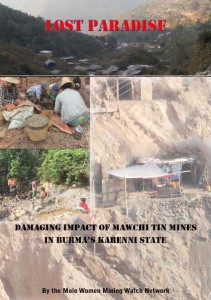Lost Paradise: Damaging Impact of Mawchi Tin Mines in Burma’s Karenni State
By Molo Women Mining Watch Network • December 11, 2012 The Molo Women Mining Watch Network was formed by women from the Karenni Women’s Organization, Karenni Social Welfare and Development Centre and Karenni Evergreen Organization, who wanted to research information about the Mawchi tin mines. The network was named after the Molo Stream which flows from the Mawchi mines to the Salween River. It aims to work for women throughout our state who are facing social and environmental impacts of mining, and to empower them to solve these problems.
The Molo Women Mining Watch Network was formed by women from the Karenni Women’s Organization, Karenni Social Welfare and Development Centre and Karenni Evergreen Organization, who wanted to research information about the Mawchi tin mines. The network was named after the Molo Stream which flows from the Mawchi mines to the Salween River. It aims to work for women throughout our state who are facing social and environmental impacts of mining, and to empower them to solve these problems.
The first digging activities in the Mawchi area were carried out by local people themselves, who took the minerals to sell in Toungoo. After the British learned about the existence of the minerals in 1830, the British government sent a man named Mr. D. Molly and two assistants to Mawchi to research the mine. After this, a British government delegation came to meet Kay Pho Du, Sawphya (ruler) of Kyepogyi, and made an agreement to start tin mining in the area.
The high quality tin and tungsten from the Mawchi mines has been exported to world markets since the British colonial times. The Mawchi area even became known as “Little England.” However, even though the Mawchi mine is more than a century old, there has been no improvement in the lives of the local people. No group has researched exactly what has been happening to the people and the environment as a result of the mining, even though it has been going on since 1830.
This report documents the increased militarization around the Mawchi mines, as well as the different social and environmental impacts they have had on the local community.
Tags: Karenni, Mawchi Tin Mines, Molo Women Mining Watch NetworkThis post is in: Business and Human Rights, Environmental and Economic Justice, Spotlight
Related PostsFBR’s relationship with the Burma Government and an Assessment of the Current Situation in Burma
Ethnic Communities: Salween Dams are Fueling War and Must be stopped
Karenni Women at the Border Holds First Convention Back Home
Love Salween Group Condemns Blocking of Free Expression in Karenni State
Position on the Repatriation of Refugees from Burma









 All posts
All posts